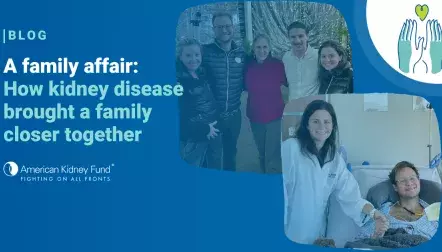Artículo
Etapas o estadios de la enfermedad renal
Sepa a qué se refieren las etapas de la enfermedad renal crónica (ERC) y la relación que hay entre las etapas y el resultado de la prueba de eGFR. Vea un resumen de cada una de las cinco etapas.
El paso entre las diversas etapas de la enfermedad renal suscita a menudo numerosas dudas e inquietudes. Queremos ofrecer un espacio útil e informativo que lo/a ayude a entender cada una de las cinco etapas de la enfermedad renal. Conozca las alteraciones que se producen en los riñones al progresar la enfermedad, sepa cómo cuidar de su salud e infórmese sobre las opciones de tratamiento.
Nuestra intención es ofrecerles a usted y a sus seres queridos los conocimientos que necesiten para enfrentar este reto con confianza y esperanza.
La enfermedad renal crónica (ERC) se produce cuando los riñones están dañados y no son capaces de depurar bien la sangre. El médico determina el grado de función renal mediante dos análisis: uno de sangre y otro de orina. El análisis de sangre estudia la filtración glomerular estimada (eGFR) o la cantidad de creatinina (un producto de desecho) que hay en la sangre. El análisis de orina estudia el cociente albúmina/creatinina urinario (uACR) y la posible presencia de un problema llamado albuminuria, que consiste en que la orina (es decir, el pis) contiene una proteína llamada albúmina. Para saber si la persona tiene ERC, el médico le repite estos análisis con la intención de determinar si el daño renal es persistente (es decir, que se mantiene durante un mínimo de 3 meses).
Sabiendo la causa y los datos de la eGFR y el uACR, el médico determinará la etapa en que se encuentra la ERC de la persona. Esta información les permitirá a usted y a su médico conocer el riesgo de que empeore la enfermedad renal y de que aparezcan complicaciones (por ejemplo, insuficiencia cardíaca), así como conocer sus opciones de tratamiento.
¿A qué se refieren las etapas de la enfermedad renal crónica (ERC)?
La ERC se divide en cinco etapas o categorías que dependen del valor de la eGFR. Las cinco etapas de la ERC se refieren al grado de funcionamiento de los riñones. La enfermedad renal puede empeorar con el tiempo. En las primeras etapas (de la 1 a la 3), los riñones aún son capaces de depurar los desechos de la sangre. En las últimas etapas (la 4 y la 5), a los riñones les cuesta más trabajo depurar la sangre y podrían dejar de funcionar por completo.
La etapa 1 de la ERC (eGFR de 90 o más)
La ERC en etapa 1 significa que la persona tiene una eGFR normal de 90 o más y un daño renal leve. Los riñones aún funcionan bien, por lo que quizá no tenga síntomas. Podría haber otras señales de daño renal, como por ejemplo la presencia de proteínas en la orina, que se puede detectar con la prueba del uACR.
Infórmese sobre la enfermedad renal crónica (ERC) en etapa 1
La etapa 2 de la ERC (eGFR de entre 60 y 89)
La ERC en etapa 2 significa que la eGFR ha caído a entre 60 y 89 y la persona tiene un daño renal leve. Los riñones casi siempre funcionan bien aún, por lo que quizá no tenga síntomas. Quizá tenga otras señales de daño renal, como por ejemplo la presencia de proteínas en la orina o daños físicos.
Infórmese sobre la enfermedad renal crónica (ERC) en etapa 2
La etapa 3 de la ERC (eGFR de entre 30 y 59)
La ERC en etapa 3 significa que la eGFR está entre 30 y 59 y la persona tiene un daño renal leve o moderado. Los riñones no hacen como es debido su función de depurar los desechos y eliminar el líquido extra de la sangre. Estos desechos se pueden acumular en el organismo y empezar a causar otros problemas de salud, como la presión arterial alta y las alteraciones en los huesos. Podrían empezar a aparecer síntomas, tales como la debilidad, el cansancio o la hinchazón de pies y manos.
La ERC en etapa 3 se divide en dos subetapas en función de la eGFR :
- La etapa 3a significa que la persona tiene una eGFR de entre 45 y 59
- En la etapa 3b, la eGFR está entre 30 y 44
Con el tratamiento y las modificaciones del estilo de vida, muchas personas que están en la etapa 3 no progresan a las etapas 4 o 5.
Infórmese sobre la enfermedad renal crónica (ERC) en etapa 3
La etapa 4 de la ERC (eGFR de entre 15 y 29)
La ERC en etapa 4 significa que la eGFR está entre 15 y 29 y la persona tiene un daño renal moderado o severo. Los riñones no hacen como es debido su función de depurar los desechos de la sangre. Estos desechos se pueden acumular en el organismo y causar otros problemas de salud, como la presión arterial alta, las alteraciones en los huesos y la insuficiencia cardíaca. Es probable que aparezcan síntomas como la hinchazón de las manos y los pies y el dolor en la parte baja de la espalda.
Esta etapa es importante porque es la última antes de la falla renal. Es importante acudir periódicamente al nefrólogo (el médico de los riñones) para tomar medidas que retrasen el daño renal y planificar de antemano los posibles tratamientos para la falla renal.
Infórmese sobre la enfermedad renal crónica (ERC) en etapa 4
La etapa 5 de la ERC (eGFR menor de 15)
La ERC en etapa 5 significa que la eGFR es menor de 15 y la persona tiene enfermedad renal terminal. Los riñones están a punto de fallar o ya fallaron (dejaron de funcionar). Puesto que los riñones dejaron de depurar los productos de desecho de la sangre, estos se pueden acumular en el organismo, lo cual puede hacer que la persona se ponga muy enferma y causarle otros problemas médicos. Cuando los riñones fallan, las únicas opciones de tratamiento que permiten seguir con vida son la diálisis y el trasplante renal.
Infórmese sobre la enfermedad renal crónica (ERC) en etapa 5
Las etapas de la albuminuria
La ERC se clasifica también en función de la albuminuria, la cual se mide con un análisis de orina. Esta información les permitirá a usted y a su médico conocer mejor el riesgo de que aparezcan complicaciones y saber si la enfermedad renal está empeorando (por ejemplo, está progresando hacia la falla renal). Hay 3 categorías de albuminuria.
- A1: La cantidad de proteínas en la orina es normal o está ligeramente aumentada (menos de 30 mg/g o 3 mg/mmol)
Es la categoría ideal y significa que los riñones funcionan con normalidad o apenas están afectados. Aunque la orina contenga un poco de albúmina, se trata de cantidades muy pequeñas. - A2: La cantidad de proteínas en la orina está moderadamente elevada (30-300 mg/g o 3-30 mg/mmol)
Esta categoría significa que la orina contiene una cantidad apreciable de albúmina, lo cual quiere decir que los riñones están más afectados. Es posible que usted y su médico tengan que hablar sobre formas de controlar su salud renal e impedir que el daño aumente. - A3: La cantidad de proteínas en la orina está muy elevada (>300 mg/g o >30 mg/mmol)
En esta categoría, la orina contiene mucha albúmina. Esto significa que el daño renal es severo y que la persona corre más riesgo de presentar falla renal u otras complicaciones (por ejemplo, insuficiencia cardíaca).
Encárguese de su propia salud renal con la herramienta Know Your Kidneys ("Conozca sus riñones"). Se trata de una herramienta sencilla e interactiva que brinda perspectivas y consejos personalizados para ayudar a la persona a proteger sus riñones y conservar su salud. Introduzca los valores de sus análisis clínicos para saber qué dicen esos números sobre su salud renal.








